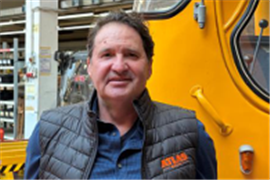German construction machinery sales growth
17 March 2016
A 7% rise in sales was seen in 2015 for German construction equipment manufacturers, with the country’s manufacturers’ trade organisation the VDMA (Verband Deutscher Maschinen- und Anlagenbau) reporting that the figure had reached €9 billion.
The VDMA said that while German manufacturers’ sales developed positively, the global market for construction equipment experienced a double-digit downturn.
Johann Sailer, chairman of the Construction Equipment & Building Material Machinery Association within the VDMA, said that German companies were not affected as much as other markets by the severe downturns in, for example, China, Latin America and Russia.
“Instead, we participated in the above-average positive developments of the European, Middle East and North American markets,” he said.
Prospects for 2016, however, are mixed, according to the VDMA. It said construction equipment manufacturers were expecting positive stimuli for business in southern and central eastern Europe, and that they believed that the high-volume markets of Germany, the UK, Scandinavia and Benelux would remain robust.
Internationally, it is the Indian market in particular that is providing hope, it said.
Risks
At the same time the risks are increasing, the VDMA said, as a large number of uncertainties are being created by “political and violent conflicts, excessively low oil and raw material prices with all their implications and numerous unsolved economic crises”.
Sailer said, “These risks do not affect every market in the same way, and depending on where a company has its main business activities, it will be affected to a greater or lesser extent.”
The VDMA added that as in the last two years, very little could be expected from Russia. It said the same was true for Latin America and China, which it said was no longer the largest market in the world.
It forecast that two former growth areas – North America and the Middle East – would experience the direct and indirect effects of oil and gas prices, and would not continue to develop as positively as they had in the last few years.
According to the VDMA, against this backdrop of enormous uncertainties, it would be wrong to take growth for granted on an individual company level in 2016.
The industry as a whole, however, is expecting a slight sales increase of 3%, it said, adding that this would be the third consecutive year of growth – and that it would be regarded as a big success in a difficult global environment.
“As manufacturers, we always feel positive about a year where there is Bauma, and approach it with a good deal of optimism,” said Sailer. The Bauma show runs from 11 to 17 April, in Munich, Germany.
Emissions
The VDMA felt, however, that a major backlash could be expected from the political debate on exhaust emissions.
According to the latest plans drawn up by Berlin’s Senate Department for Urban Development & the Environment, all construction equipment will need to be colour-coded to indicate its emission level. This is already being done for cars.
The VDMA said that when applied to construction equipment, however, the new regulations were threatening to put a stop to any modernisation. It said that machinery equipped with extremely complex and expensive exhaust emission aftertreatment would be in a worse position than ancient, inefficient machines retrofitted with diesel particle filters (DPFs), which only achieved good values when it came to particulate emissions.
The association claimed the city state of Berlin was threatening to play “an environmental prank”, as the pollution caused by such outmoded machinery was several times higher. It added that such machines were twice as noisy, used about 15% more fuel and emitted over 90% per cent more nitrogen oxides (NOx).
The managing director of the association, Joachim Schmid, also saw this development as a direct consequence of the DPF retrofit debate, fuelled by Germany’s environmental organisation Deutsche Umwelthilfe (DUH)
Schmid said, “Retrofitting can never be a satisfactory solution. It impedes the placing of state-of-the-art, environment-friendly equipment on the market.
“It has long been standard practice to ignore economic arguments, but we are now seeing a totally new level, where comprehensive environmental protection is being sacrificed to one-eyed arguments that focus on isolated details.”




